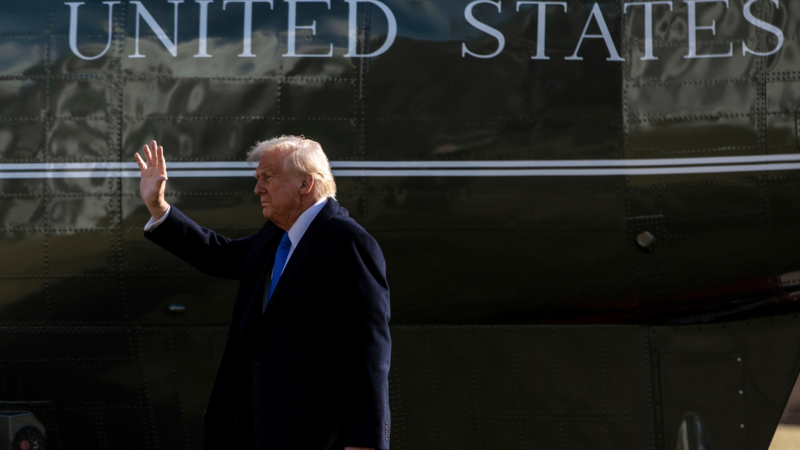What to know about presidents and security clearances
The question of who should have access to the nation’s secrets is one of the utmost importance. In the past two presidential terms, that question has been aimed at former presidents themselves.
In 2021, then-President Biden barred then-former President Donald Trump access to intelligence briefings, arguing that Trump could not be trusted because of his “erratic behavior.”
Since returning to office, Trump on Friday said he was doing the same to his predecessor, blaming Biden for setting the precedent and ending a courtesy traditionally provided to former presidents.
More specifically, Trump said he would immediately revoke Biden’s “security clearances,” though in reality, Biden did not have a security clearance to begin with.
“He didn’t have a security clearance in the way that folks in the military or intelligence agencies or the FBI have them, by going through the security clearance process,” said Dakota Rudesill, a law professor at the Ohio State University who has written about national intelligence and secrecy.
Here’s what to know about presidents and security clearances.
Presidents have access to secrets, but don’t receive formal security clearances
Most Americans, like federal workers or military personnel, need a formal security clearance before they can gain access to classified information or secured facilities. The process can include jumping through a number of hoops, from a background check to a polygraph test, depending on the tier. The purpose is to determine if a person can be entrusted with sensitive information.
But for the president, vice president, members of Congress, Supreme Court justices, and other government official positions outlined in the Constitution, that determination is not made by a federal investigator, but rather by election or appointment. Their access expires once they leave office.
The sitting president has access to nearly all of the nation’s secrets, as well as the powers to classify and declassify material — as seen last month, when Trump vowed to declassify thousands of documents related to the assassinations of former President John F. Kennedy, his brother Robert F. Kennedy, and civil rights leader Martin Luther King Jr.
What remains out of the sitting president’s purview is the ability to declassify nuclear information, which is determined by law written by Congress, according to Rudesill, who has previously worked in government for the U.S. intelligence community and held a high-level security clearance.
”Congress statutorily governing nuclear classified information in a way that they have not governed any other kind of national secret is a product of the Cold War and the massive role in the Cold War of nuclear weapons,” he said.
Much is up to the sitting president’s discretion
Because presidents do not receive formal security clearances, their ability to gain access to classified information once they leave office is completely up to their successor.
”The history of access to classified information for former presidents has been very ad hoc,” Rudesill said. “If a former president knows something about a matter that a current president or administration is working on, that former president will be briefed as a matter of courtesy.”
He pointed out that then-President Obama called former President George W. Bush in 2011 to personally share that the mastermind behind the 9/11 attacks, Osama bin Laden, had been killed.
Rudesill added that sitting presidents do not need to go through any formal process to disclose classified information, except in the case of nuclear matters.
“ The president can just make decisions on the spot about who gets access and who does not,” he said.
For these reasons, Rudesill calls the sitting president the “most powerful actor within the massive secrecy apparatus.”
Congress technically has the authority to limit some of the executive branch’s powers around granting and revoking access to classified information, but those efforts have historically not been successful, according to Rudesill.
“Congress has written actually relatively little law with regard to classified information and security clearances, and mainly provided penalties for people who leak or improperly disclose classified information,” he said.
Taiwan’s president pledges to defend island’s sovereignty after Chinese military drills
Taiwanese President Lai Ching-te vowed to defend the self-ruled island's sovereignty in the face of what he termed China's "expansionist ambitions," days after Beijing wrapped up live-fire military drills near its shores.
Deaths reported during widening protests in Iran sparked by ailing economy
The protests began due to economic pressures, with Iran's currency rapidly depreciating. Demonstrators have also chanted against the country's theocracy.
Congress failed to extend Obamacare subsidies. This Democrat says Trump can save them
Sen. Peter Welch, D-Vt., says he thinks the Senate can pass a "retroactive" Affordable Care Act subsidy extension, but "we need President Trump."
Rideshare union rights, social media limits and other state laws taking effect Jan. 1
Every new year, public media reporters across the country bring us some of the new state laws taking effect where they are. Here are six in 2026.
Guides to help you tackle your New Year’s resolutions
From building your strength to tackling credit card debt, NPR's Life Kit has a newsletter journey to help you tackle your New Year's resolution.
Guides to help you tackle your New Year’s resolutions
From building your strength to tackling credit card debt, NPR's Life Kit has a newsletter journey to help you tackle your New Year's resolution.






